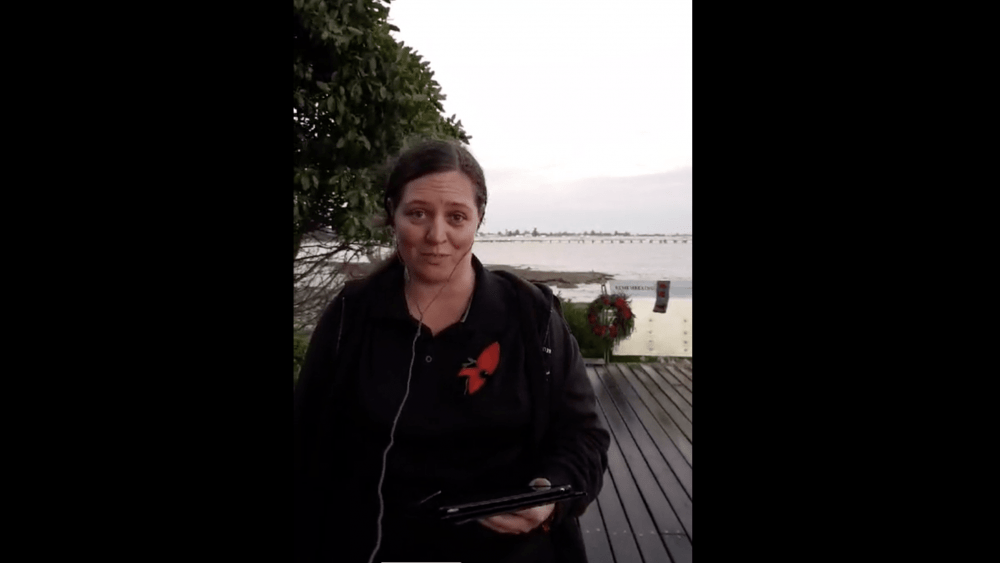Christian leader marks 250 years since Cook's 'first contact' with Aboriginal peoples
Today, the 250th anniversary of British explorer James Cook’s first contact with Aboriginal people was solemnly marked at the site of that encounter, by Brooke Prentis, Aboriginal woman, Christian and CEO of Common Grace.
“I’m here at Kurnell. At sunrise,” broadcast Prentis this morning on FaceBook Live, sharing her personal reflections about the historic landing.
“I lament. I mourn. I cry out from pain. I cry out for justice. I weep.” – Brooke Prentis
“Today is 250 years to the day since the arrival of Lieutenant James Cook and his encounter with the Gweagal peoples. Today is thousands of years of history, story, family, and connection of the Gweagal peoples that was disrupted 250 years ago.
“Today we have not achieved reconciliation and justice for Aboriginal peoples in these lands now called Australia.”
Acknowledging she was on the lands and waters of the Gweagal people, Prentis said she felt a “spiritual pull to this place today.”
“I stand here today as an Aboriginal woman who now lives on the lands of the Gadigal peoples, in the place now called Sydney.
“I stand here as a Christian. I acknowledge that in the name of Christianity and in the name of Jesus, Aboriginal people have died, been abused, and suffered injustice and inequality.
“I reclaim Jesus in this place as a Jesus that calls us to love our neighbour as ourself. Australia has a long way to go to love their Aboriginal neighbour.”
During the 20-minute video, the leader of Christian justice movement Common Grace quoted from the diaries of Lieutenant James Cook and his men. These described Gweagal people as “in all appearance [they] resolvd to dispute our landing to the utmost” and “their countenance bespoke displeasure.”
Prentis also took the words from a plaque at the Kurnell site, written by a Gweagal Elder, Aunty Beryl Timbery-Beller: “One thing Aboriginal people can never forget is the landing of Lt Cook and his men at this place in 1770. The story of this landing has been told through generations and it marks the beginning of dispossession for Aboriginal people.”
“We feel the combined pain. Now is the time for your healing. Lord, we need it so. Amen” – Brooke Prentis
Also citing Psalm 137 and Habbakuk 2:12 (“Woe to him who builds a city with bloodshed and establishes a town by injustice!”), Prentis called for Indigenous people to receive “recognition with dignity and reconciliation with repentance” in Australia.
“I lament. I mourn. I cry out from pain. I cry out for justice. I weep,” said Prentis.
At the site, Prentis placed several symbolic items including a desert pea flowers, representing “First Nations peoples who died through invasion and the effects of colonisation in these lands now called Australia.” On top of a copy of the University of Newcastle’s map of the massacres of Indigenous people in Australia, Prentis poured actual ash, sand, and earth from every state and territory. These had been carried to Kurnell several years ago, by Aboriginal and Torres Strait Islander peoples attending the Grasstree Gathering 2018.
Prentis finished with a prayer for “healing” for all members of Australian society, written by Pastor Mark Kickett of the Uniting Aboriginal and Islander Christian Congress and requested by senior Aboriginal Leader Aunty Jean Phillips.
“Great Creator Spirit. We Aboriginal and Torres Strait Islander peoples, and non-Indigenous peoples now of many cultures, humble ourselves in prayer and seek your face. We feel the combined pain. Now is the time for your healing. Lord we need it so. Amen.”





